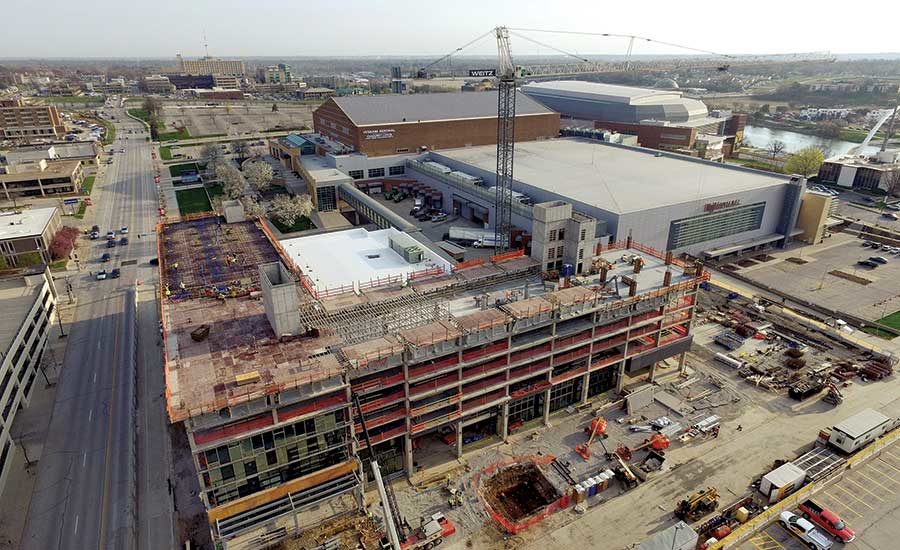Iowa Governor Weighs Bill To End Design-Build Carveout | Columbus Ohio Dump Trucks
Legislation would no longer allow universities to use DB approach

A bill passed by both houses of the Iowa legislature promises to open commercial construction and most public projects in the state to the construction manager at-risk delivery and procurement method but would also end use of design-build on columbus oh dump truck work at public universities.
Senate Bill 183 is supported by the Iowa Associated General Contractors and the Master Builders of Iowa.
All construction projects in Iowa that involve public money must, by statute, use a design-bid-build contract. Iowa and North Dakota are the only two states in the US that that bar the design-build method from public projects.
If the bill is signed by Gov. Kim Reynolds (R), however, public university projects for the Board of Regents could no longer use design-build contracts. To date, the board has signed 14 contracts using design-build and completed seven projects—at the University of Iowa, Iowa State University, the University of Northern Iowa and at the state's two public special schools.
The bill would would also prohibit governmental entities from using a fee-based selection of an architect, landscape architect or engineer for a public improvement.
Closing a Loophole?
According to the Associated General Contractors of Iowa, the Board of Regents never really had the power to use design-build, despite the project results universities have had. The chapter contends that the board has been using it illegally.
"Currently, Iowa law does not authorize design-build procurement for any level of government," said Scott Newhard, AGC of Iowa vice president for public affairs. "The regents' institutions on their own decided to do design-build without legislative authority. The legislature now has made it clear to the regents that they must stop this. If they wish to use CM at-risk as an alternative to design-bid-build, they may do so."
A spokesman for the Board of Regents did not respond to phone and e-mail queries from ENR for comment.
AGC of Iowa supported efforts by the Master Builders to open all but road projects to CM at-risk, Newhard said. The bill specifies the approach must be for vertical infrastructure and not highway work. It completely prohibits design-build procurement. AGC of Iowa and the Master Builders of Iowa have long-opposed design-build in the state.
Nationally, AGC does not prefer one delivery method over the other but provides resources to its chapters and members to "help them succeed regardless of the delivery method," said Brian Turmail, vice president of public affairs and strategic initiatives. He added that its Iowa chapters, AGC of Iowa and the Master Builders, "are in the best position to know which contracting methods columbus oh dump truck work best for Iowa."
House Votes on Party Lines
Several amendments sponsored by Democrats were rejected before the bill passed the Iowa House on Feb. 24, in a 53-44 vote, mostly along party lines, with Republicans for and Democrats against. Rep. Bruce Hunter (D-Des Moines) proposed to allow government bodies to choose the process "best for the project and the taxpayer."
Hunter told the Quad City Times that 88% of Board of Regents projects over the past seven years have been lowest responsible bidder, but in instances when design-build was used, it saved taxpayer money.
There are major differences between the two procurement and project delivery methods. CM at-risk is still a traditional design-bid-build approach, even though it leverages some collaboration between architect and constructor used in design–build. Those professionals are linked from the bidding stage in a design-build bid selection, whether the project is led by a contractor or by an architect or engineer.
More Infrastructure Law Options
An executive from a major Des Moines contractor said having the option of CM at-risk would open Iowa public construction to a procurement and delivery method it badly needs. With Infrastructure Investment and Jobs Act money now being distributed to states, having the delivery method as an option would help expedite some funded projects, despite highway construction continuing to be executed as design-bid-build only.
Lisa Washington, CEO and executive director of the Design-Build Institute of America, noted that at a recent summit held by the Federal Highway Administration and the U.S. Dept. of Transportation Build America program, officials said they are working with five universities to to help states and localities use infrastructure law funding. "The core of their messaging was the value of alternative delivery methods like design-build," she said.
The Institute, which opposed the Iowa bill, wants the state and North Dakota to eventually join the other 48 states that allow the delivery method. Iowa building trades and other labor unions also opposed the bill.
"It was road builders who were not even affected by this legislation that really pushed it," said Richard Thomas, institute director of state and local legislative affairs. He said there were enough Iowa House members to pass the Hunter amendment, but the House Republican majority leader and speaker paused the vote. "and they started pulling their members out to get them to switch their vote."
Gov. Reynolds Has Final Say
Gov. Reynolds has had no public comment on the bill and has not indicated whether she supports it.
"The Governor, and our team, will review all bills that reach her desk. She has 30 days from the end of legislative session to act on bills from this session," said Alex Murphy, Reynolds' communications director. "Our legislative session is still ongoing at this time."
April 19 will be the 100th day of the legislature's current session but it will continue to address several remaining issues, including a vote on an $8-billion state budget for fiscal 2023.
